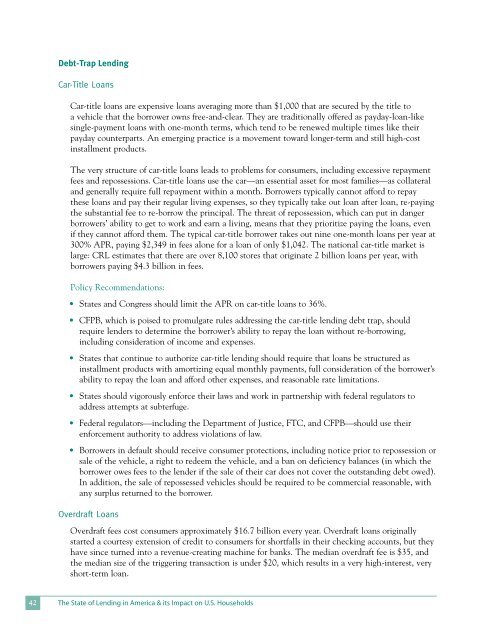Create successful ePaper yourself
Turn your PDF publications into a flip-book with our unique Google optimized e-Paper software.
Debt-Trap Lending<br />
Car-Title Loans<br />
Car-title loans are expensive loans averaging more than $1,000 that are secured by the title to<br />
a vehicle that the borrower owns free-and-clear. <strong>The</strong>y are traditionally <strong>of</strong>fered as payday-loan-like<br />
single-payment loans with one-month terms, which tend to be renewed multiple times like their<br />
payday counterparts. An emerging practice is a movement toward longer-term and still high-cost<br />
installment products.<br />
<strong>The</strong> very structure <strong>of</strong> car-title loans leads to problems for consumers, including excessive repayment<br />
fees and repossessions. Car-title loans use the car—an essential asset for most families—as collateral<br />
and generally require full repayment within a month. Borrowers typically cannot afford to repay<br />
these loans and pay their regular living expenses, so they typically take out loan after loan, re-paying<br />
the substantial fee to re-borrow the principal. <strong>The</strong> threat <strong>of</strong> repossession, which can put in danger<br />
borrowers’ ability to get to work and earn a living, means that they prioritize paying the loans, even<br />
if they cannot afford them. <strong>The</strong> typical car-title borrower takes out nine one-month loans per year at<br />
300% APR, paying $2,349 in fees alone for a loan <strong>of</strong> only $1,042. <strong>The</strong> national car-title market is<br />
large: CRL estimates that there are over 8,100 stores that originate 2 billion loans per year, with<br />
borrowers paying $4.3 billion in fees.<br />
Policy Recommendations:<br />
• States and Congress should limit the APR on car-title loans to 36%.<br />
• CFPB, which is poised to promulgate rules addressing the car-title lending debt trap, should<br />
require lenders to determine the borrower’s ability to repay the loan without re-borrowing,<br />
including consideration <strong>of</strong> income and expenses.<br />
• States that continue to authorize car-title lending should require that loans be structured as<br />
installment products with amortizing equal monthly payments, full consideration <strong>of</strong> the borrower’s<br />
ability to repay the loan and afford other expenses, and reasonable rate limitations.<br />
• States should vigorously enforce their laws and work in partnership with federal regulators to<br />
address attempts at subterfuge.<br />
• Federal regulators—including the Department <strong>of</strong> Justice, FTC, and CFPB—should use their<br />
enforcement authority to address violations <strong>of</strong> law.<br />
• Borrowers in default should receive consumer protections, including notice prior to repossession or<br />
sale <strong>of</strong> the vehicle, a right to redeem the vehicle, and a ban on deficiency balances (in which the<br />
borrower owes fees to the lender if the sale <strong>of</strong> their car does not cover the outstanding debt owed).<br />
In addition, the sale <strong>of</strong> repossessed vehicles should be required to be commercial reasonable, with<br />
any surplus returned to the borrower.<br />
Overdraft Loans<br />
Overdraft fees cost consumers approximately $16.7 billion every year. Overdraft loans originally<br />
started a courtesy extension <strong>of</strong> credit to consumers for shortfalls in their checking accounts, but they<br />
have since turned into a revenue-creating machine for banks. <strong>The</strong> median overdraft fee is $35, and<br />
the median size <strong>of</strong> the triggering transaction is under $20, which results in a very high-interest, very<br />
short-term loan.<br />
42<br />
<strong>The</strong> State <strong>of</strong> Lending in America & its Impact on U.S. Households


